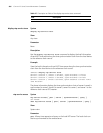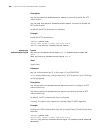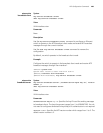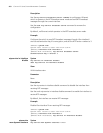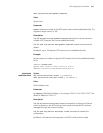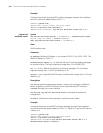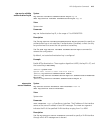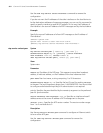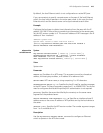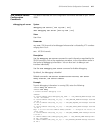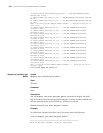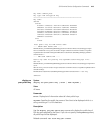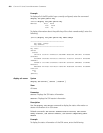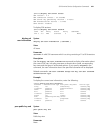414 CHAPTER 12: USING SYSTEM MANAGEMENT COMMANDS
Use the undo ntp-service source-interface command to remove the
configuration.
If you do not want the IP addresses of the other interfaces on the local device to
be the destination addresses of response messages, you can use this command to
specify a specific interface to send all NTP packets. In this way, the IP address of
the interface is the source IP address of all NTP messages sent by the local device.
Example
Specify the source IP addresses of all sent NTP messages as the IP address of
Vla-interface1.
<SW4500> system-view
System View: return to User View with Ctrl+Z.
[SW4500] ntp-service source-interface Vlan-interface 1
ntp-service unicast-peer Syntax
ntp-service unicast-peer { remote-ip | peer-name } [
authentication-keyid key-id | priority | source-interface
Vlan-interface vlan-id | version number ]*
undo ntp-service unicast-peer { remote-ip | peer-name }
View
System view
Parameter
remote-ip: IP address of the NTP peer. This argument cannot be a broadcast
address, a multicast address, or the IP address of the local reference clock.
peer-name: Peer host name, a string comprising 1 to 20 characters.
authentication-keyid key-id: Specifies the key ID used for sending messages
to the peer. The key-id argument ranges from 1 to 4294967295. You do not need
to configure authentication-keyid key-id if authentication is not required.
priority: Specifies the peer identified by the remote-ip argument as the preferred
peer for synchronization.
source-interface Vlan-interface vlan-id: Specifies an interface whose IP
address serves as the source IP address of NTP message sent to the peer.
version number: Specifies the NTP version number. The version number ranges
from 1 to 3 and defaults to 3.
Description
Use the ntp-service unicast-peer command to configure an Ethernet switch
to be an active NTP peer.
Use the undo ntp-service unicast-peer command to remove the
configuration.



